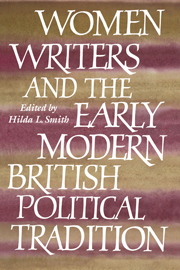Book contents
- Frontmatter
- Contents
- List of contributors
- Preface
- Introduction: Women, intellect, and politics: their intersection in seventeenth-century England
- Part I Women's political writings, 1400–1690
- Part II Women's political and philosophical writings, 1690–1800
- Part III The intellectual context and economic setting for early modern women
- Introduction to Part III
- 9 Contract and coercion: power and gender in Leviathan
- 10 The significant sounds of silence: the absence of women from the political thought of Sir Robert Filmer and John Locke (or, “Why can't a woman be more like a man?”)
- 11 Catharine Macaulay: patriot historian
- 12 Investments, votes, and “bribes”: women as shareholders in the chartered national companies
- Part IV Early modern legal and political prescriptions for women
- Conclusion: women's writing, women's standing: theory and politics in the early modern period
- Index
10 - The significant sounds of silence: the absence of women from the political thought of Sir Robert Filmer and John Locke (or, “Why can't a woman be more like a man?”)
from Part III - The intellectual context and economic setting for early modern women
Published online by Cambridge University Press: 04 August 2010
- Frontmatter
- Contents
- List of contributors
- Preface
- Introduction: Women, intellect, and politics: their intersection in seventeenth-century England
- Part I Women's political writings, 1400–1690
- Part II Women's political and philosophical writings, 1690–1800
- Part III The intellectual context and economic setting for early modern women
- Introduction to Part III
- 9 Contract and coercion: power and gender in Leviathan
- 10 The significant sounds of silence: the absence of women from the political thought of Sir Robert Filmer and John Locke (or, “Why can't a woman be more like a man?”)
- 11 Catharine Macaulay: patriot historian
- 12 Investments, votes, and “bribes”: women as shareholders in the chartered national companies
- Part IV Early modern legal and political prescriptions for women
- Conclusion: women's writing, women's standing: theory and politics in the early modern period
- Index
Summary
The subjection of women and their exclusion from civic membership and social significance played important, but largely implicit, roles in the patriarchal political theory of Sir Robert Filmer, the mid-seventeenth-century apologist for Stuart absolutism. His theory rested upon an extremely oppressive, patriarchal conception of familial authority, and, accordingly, there is something puzzling about the fact that Filmer said little explicitly about the status of women. He argued from a divinely ordained inferiority of women manifested in their natural status as wives and the equally natural and divine subjection of children and servants to their natural, male superiors – husbands, fathers, and masters – to the divinely natural and patriarchal character of politics. Kings, he insisted, and others in authority, rule by a natural, patriarchal entitlement instituted by God before the expulsion of Adam and Eve from Paradise. Although children and servants appear frequently in his reasoning, Sir Robert's theory was constructed with hardly any mention of women.
Filmer's relative indifference toward women invites two related inferences, which, together, diminish the puzzlement: first, that – however unwittingly – Filmer accepted the practices and beliefs of his society and tacitly built his theory upon these conventions, and second, that the exclusion by silence effectively rendered women invisible in his scheme. The family, of course – pun and all – is inconceivable without women, so the result of Filmer's silence is a powerful paradox in which the central and foundational figures are effectively ignored.
- Type
- Chapter
- Information
- Women Writers and the Early Modern British Political Tradition , pp. 220 - 242Publisher: Cambridge University PressPrint publication year: 1998
- 7
- Cited by

